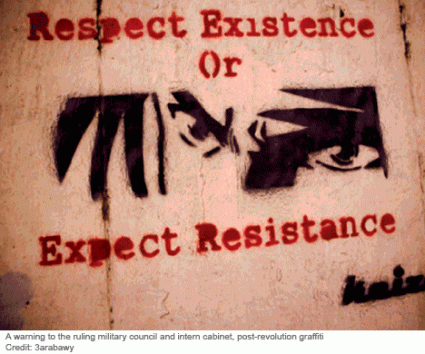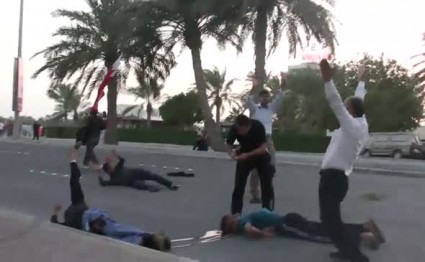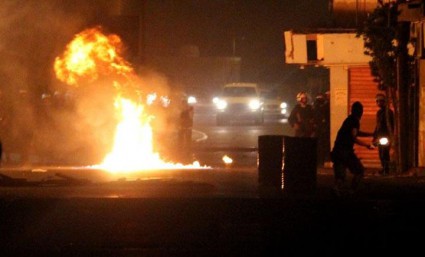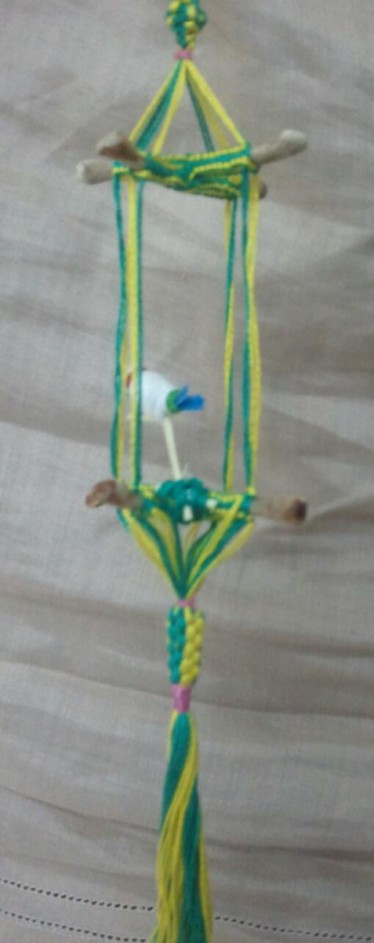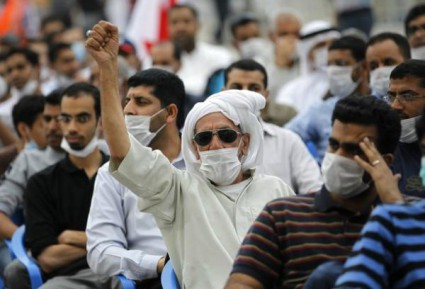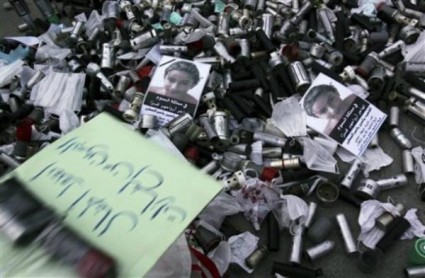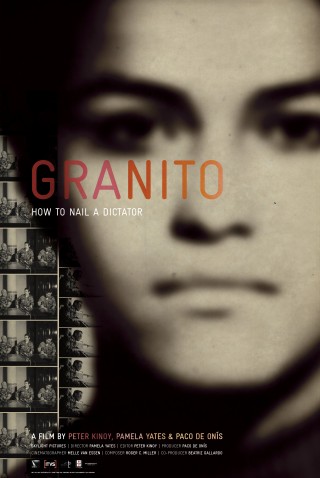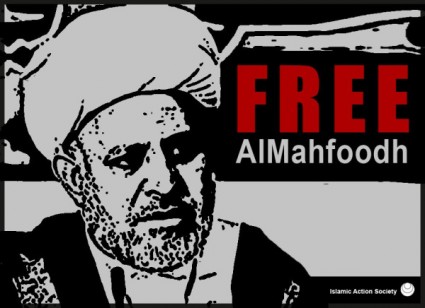Posts from — March 2012
US Policy Makers: Your Policy in Bahrain Has Gone Beyond Tolerance
To the US Policy Makers: Your Policy in Bahrain Has Gone Beyond Tolerance
30 – March, 2012
The message you attempted to convey through your Deputy Ambassador’s visit to the injured regime mercenaries has been received. Now it is our turn to reply.
Since the eruption of the Arab Spring last year, your policies have been full of hypocrisy, supporting popular pro-democracy revolutions only when it would serve your selfish interests. The exact reasons that led to the outbreak of the Arab Spring in Tunisia, Egypt, Libya, Yemen and Syria were applicable to Bahrain, yet you have chosen to side with the illegitimate regime of Al-Khalifa. Your justification to side with the illegitimate regime of Al-Khalifa is completely irrelevant to us. Our people have nothing to do with your conflict with the Islamic Republic of Iran. Your decisions and actions have only made our people more determined to reject your policies and gave them the motive to retaliate in the future, should your current policies persist.
The mercenaries that your Deputy Ambassador has paid her respects to have come all the way from Pakistan and other countries to kill our people; more than eighty have been killed so far. Thousands have been injured by the hand of those mercenaries including women and children, and many credible human rights organizations such as Bahrain Center for Human Rights, HRW, Amnesty International and HRF have comprehensively documented most of the cases.
It would have been more appropriate for your Deputy Ambassador to visit the victims of those mercenaries.
We have pledged to “refuse all forms of foreign intervention, whether direct or indirect” (Lulu Charter, Principle # 4). We consider this visit as an irresponsible act of interference that cannot be overlooked.
As such, the Pearl Revolution Political Center is going to call for a nation-wide anti-US protest campaign that will not spare the illegal presence of your 5th Fleet in our country and the counter-revolution that your embassy has been feeding behind the scene.
Pearl Revolution Political Center
March 28th 2012
…source
March 30, 2012 No Comments
“We are brothers, Sunnis and Shias” – Bahrain revolution defies repression
Bahrain revolution defies repression
30 March, 2012 – By Tony Iltis – GreenLeft AU
On March 14 last year, four days before the NATO intervention in Libya, there was a less publicised Western-supported military intervention. A Saudi-led force invaded Bahrain to put down democracy protests against that country’s absolute monarchy.
Despite the repression, fresh protests have broken out. Press TV said on March 27 that thousands of Bahrainis rallied calling for the overthrow of King Hamad bin Isa and his Al Khalifa dynasty.
The protests were at the funeral of Ahmad Abdul Nabi, killed by tear gas at an earlier demonstration. Deaths through tear gas inhalation are common in Saudi-occupied Bahrain.
On March 26, the Bahrain Centre for Human Rights released a report documenting human rights violations since the publication of the Report of the Bahrain Independent Commission of Inquiry (BICI) last November 2011.
The report is a grim catalogue of extrajudicial killings, arbitrary arrests, torture and excessive use of force, political imprisonment and trials, religious discrimination, kidnappings, politically motivated sackings and harassment of the media.
On March 22, Al-Manar TV reported that Bahraini security forces kidnapped, beat and raped 16-year-old Ali Al-Sankees “due to his refusal to work with the Bahraini forces as an informant”.
Western media has echoed the Bahraini monarchy in characterising the opposition as a sectarian Shiite movement. Bahrain’s ruling elite is drawn from the Sunni minority and the Shiite majority face discrimination.
However, a representative of the Coalition of February 14th Youth told Jadaliyya.com on March 22: “This is a big lie through which the Al-Khalifa regime seeks to mislead international public opinion … The first political prisoner since the revolution started is the Sunni, Muhammad al-Buflasa …
“How can it be called sectarian, when the goal of the revolution is for all citizens, whether Sunni or Shia, to become equal in their rights and duties …
“The most prominent and most important slogan of this revolution is ‘We are brothers, Sunnis and Shias, and we will not sell out this country’.” …source
March 30, 2012 No Comments
Nasrallah slams Arab summit in Iraq for ignoring events in Bahrain
Nasrallah slams Arab summit in Iraq for ignoring events in Bahrain
30 March, 2012 – The Daily Star
BEIRUT: Hezbollah chief Sayyed Hasan Nasrallah said Friday the international community would not intervene militarily in Syria and slammed Arab states for neglecting developments in Bahrain.
“The issue of forcing the collapse of the [Syrian] government by military force is over,” Nasrallah said, pointing to recent regional and international meetings and their outcomes.
“The options of military intervention, arming the opposition or sending in Arab troops are off the table,” the Hezbollah chief said.
He reiterated that only a political solution could resolve the year-long unrest in Lebanon’s neighbor.
“What is needed in Syria is a political solution for the interests of Syria, the Syrian people and Syria’s strategic position,” he said.
“Talk today is on the need for dialogue between the opposition and the government under the leadership of President Bashar Assad,” he added.
He also criticized Thursday’s Arab League summit in Iraq for not placing importance on developments in Bahrain.
“Talk [on Bahrain] is not even allowed,” Nasrallah said.
….source
March 30, 2012 No Comments
Regime Murders, Kidnapping and Chemical Gas Attacks
Bahrain 21-29 March: Death, kidnapping, dismissals and more tear gas
30 March, 2012 – Bahrain Center for Human Rights
Respect for right to life:
Ahmed Abdulnabi AbdulRasool, 30 years old, died on 24 March 2012 due to tear gas suffocation as per his family. Ahmed’s sister is having trouble breathing as well due to the excessive use of tear gas by Bahraini security forces almost on a nightly basis. Ahmed’s family said that he never had any berthing problems until this past week when he suffocated from tear gas twice. Tear gas was shot directly into their home, window broken. After that Ahmed had trouble breathing and was constantly coughing. When his family insisted he go to the hospital he refused, fearing arrest.
Ahmed’s death comes one week after the death of Sabry, who also died of tear gas suffocation. Graphic picture of Ahmed after his death.
Abdat Ali AbdulMohsen from Aali died on 23 March 2012 from tear gas suffocation according to her family. Abda, who is in her 40’s, had suffered from breathing difficulties on the 15th of March, and she was taken to the hospital where she stayed for a week. On the 22nd of March her house was tear gassed again, her health deteriorated quickly and she died on the morning of the 23rd of March.
More than 30 people have died allegedly due to tear gas suffocation since the pro-democracy protests started on February 14th, 2011, from a total of more than 80.
Security forces continued to attack the large crowds participating in the funeral processions of both victims. Tear gas was used excessively; peaceful citizens and houses were targeted with tear gas.
Respect for Rights of the Child:
16 year old Ali AlSingace was kidnapped and found later on 21 March 2012 unconscious in a garage in Sanabis, half naked with his hands tied behind his back. This is the 5th time Ali has been subjected to kidnapping, he claims that they continue to target him due to him refusing to work as an informant. (More details)
A 10 year old child, Abdulla Hasan from Al Hajar was kidnapped on 22 March 2012 and beaten severely by security forces who released him later.
Respect for religious freedom:
Security forces targeted a Shia place of worship (Ma’atam or Hussaineya) in al Ghuraifa village on 24 March 2012 causing it to burn down.
Respect for right to peaceful assembly:
Security forces continued to attack peaceful protests that took place in several areas. A number of injuries were reported as a result of direct shooting of tear gas at the protesters . Injures with birdshots reported, and injured protestors still cannot seek medical care in either public nor private hospitals, for the fear of interrogation and detention by police.
March 30, 2012 No Comments
Secret State Agencies: “No Hard Evidence” Iran Building Nukes
Secret State Agencies: “No Hard Evidence” Iran Building Nukes
March to War Continues
by Tom Burghardt – 5 March, 2012 – Dissident Voice
Although all 16 U.S. secret state intelligence agencies confirmed, again, that “Iran had abandoned its nuclear weapons program years earlier,” reaffirming the “consensus view” of not one, but two National Intelligence Estimates The New York Times reported last week, the march towards war continues.
Last Saturday The Daily Telegraph, citing The Wall Street Journal, reported that “military planners have asked for emergency funding from Congress to address a perceived shortfall in defence capabilities that could undermine the ability of US forces to respond to an Iranian closure of the Strait of Hormuz.”
Plans are underway “to modify weapons systems on ships that are at present vulnerable to Iranian fast-attack boats, many of which carry anti-ship missiles,” the Telegraph averred.
Feeling the heat from pro-Israeli lobby shops and congressional grifters, President Obama told The Atlantic on Friday:
When I say we’re not taking any option off the table, we mean it. I think that the Israeli government recognizes that, as president of the United States, I don’t bluff. I also don’t, as a matter of sound policy, go around advertising exactly what our intentions are. But I think both the Iranian and the Israeli governments recognize that when the United States says it is unacceptable for Iran to have a nuclear weapon, we mean what we say.
In other words, despite repeated assertions by Iran that its nuclear program is strictly for civilian, not military, purposes facts borne out by multiple on-the-ground inspections by the International Atomic Energy Agency and assessments by American spy agencies, the bar for Iranian “compliance” is continually set higher, moved from an “active program” to a mere “capability,” it is now clear that war is the first, last, indeed only “option.”
With this mind, Times’ journalists James Risen and Mark Mazzetti informed us that lying “at the center of the debate is the murky question of the ultimate ambitions of the leaders in Tehran.”
While there is “no dispute among American, Israeli and European intelligence officials that Iran has been enriching nuclear fuel and developing some necessary infrastructure to become a nuclear power,” the Times disclosed that secret state agencies also “believe that Iran has yet to decide whether to resume a parallel program to design a nuclear warhead–a program they believe was essentially halted in 2003 and which would be necessary for Iran to build a nuclear bomb.”
In his January 31 Senate testimony, Director of National Intelligence James Clapper “stated explicitly that American officials believe that Iran is preserving its options for a nuclear weapon, but said there was no evidence that it had made a decision on making a concerted push to build a weapon.” …more
March 30, 2012 No Comments
Systematic indiscriminate chemical gas bombing by MOI Forces of Druaz Village – 16 March, 2012
These frequent attacks through-out Bahrain, transform village homes into deadly “gas chambers” resulting in Chemical Gas poisoning and death from acute respiratory distress
March 30, 2012 No Comments
Stonewalling democracy in Bahrain
West stonewalling democracy in Bahrain
29 March, 2012 – By Ismail Salami – PressTV
The West blatantly pontificates about democracy in the Middle East and North Africa and shuts its ears to the excruciating cry for social justice in Bahrain. To crown it all, it provides the regime with every means to carry out its brutality and crackdown.
Google Bahrain and you will see how inexcusably the popular uprising in the Persian Gulf sheikhdom is being blacked out by the mainstream media and how discriminatingly the Western leaders ignore the vociferous demands of a nation for democracy and social justice.
Bahraini protesters are arrested and systematically tortured on a daily basis. The head of a fact-finding mission set up by the Bahraini government to investigate reports of torture has said Manama uses the systematic policy of torture against protesters.
Cherif Bassiouni said on November 2, 2011 that he had found 300 cases of torture during his investigation.
“It is not possible to justify torture in any way, and despite the small number of cases, it is clear there was a systematic policy,” Bassiouni said in an interview with Egyptian daily Almasry Alyoum.
“I investigated and I found 300 cases of torture and I was helped in that by legal experts from Egypt and America,” he added.
Brian Dooley of Human Rights First gives a painful account of the ordeals the Bahraini protesters arrested by the Bahraini forces. He also talks about teenage boys severely beaten by the Saudi-backed forces:
“They beat us until they got tired, then other policemen would take over and beat us more,” said one boy.
On March 22, 2012, Bahraini activists released a footage detailing the rape of a child at the hands of the Saudi-backed forces in Bahrain. The footage which was enough to chill the spine and curdle the blood showed a handcuffed child with his pants down. He was badly beaten. He was left unconscious with his hands tied behind his back. He was discovered lying in a street in the village of Sanabis, outside of Manama.
Kangaroo courts are rampant in Bahrain. In a 94-page report titled No Justice in Bahrain: Unfair Trials in Military and Civilian Courts in February 2011, the Human Rights Watch blasted the grotesquely Kafkaesque trials in the country, saying such trials were crass and politically motivated.
“Grossly unfair military and civilian trials have been a core element in Bahrain’s crackdown on pro-democracy protests,” said Joe Stork, deputy Middle East director at HRW.
“The government should remedy the hundreds of unfair convictions of the past year by dropping the cases against everyone convicted on politically motivated charges and by adopting effective measures to end torture in detention,” he noted.
The group also demanded Western countries to suspend all military and security-related sales to the regime until the government fully addresses the violations. …more
March 29, 2012 No Comments
Abdulhadi Alkhawaja’s courage after fifty days on hunger strike
My fears and Abdulhadi Alkhawaja’s courage after fifty days on hunger strike
30 March, 2012 – andrew’s blog – Frontline Defenders
It is increasingly difficult to find positives when your friend has been on hunger strike for 50 days and has declared that he will pursue it to freedom or death. The shadow of despair gnaws at your heart as the days grind by.
To begin with there is plenty to do, mobilising support and explaining the background. How Abdulhadi was arrested, brutally tortured and subjected to a show trial last year, and then sentenced to life in prison. How he is an internationally respected human rights defender who helped found the Bahrain Centre for Human Rights, worked with Amnesty International and Mary Robinson and was named as ‘Activist of the Year’ in 2005 by the Arab Program for Human Rights Activists.
Thousands have sent messages of support and called on the Bahraini authorities to release him. Nobody internationally believes the ludicrous and unsubstantiated proposition that he was engaged in terrorism or a conspiracy to overthrow the Government by force.
And yet the days have dragged inexorably on, and we wait ever more anxiously for the latest news of his health. He has been taken to hospital on several occasions, but he is currently back in prison. He is reported to be physically weak, but resolute.
It is impossible not to admire the courage and determination that has sustained him in his quest for justice. It is impossible not to fear the damage already inflicted on his fragile body. It is impossible not to be angry at the callous indifference of his jailers who remain blind to the harm this ongoing tragedy does to the reputation of Bahrain.
The Danish Government has called publicly for his release on humanitarian grounds to receive medical treatment in the country of which he is a dual national. The EU and other European Governments including Ireland have supported these worthy efforts. The US Government insists it has also expressed concern.
And as we continue to mobilise international concern, and press the Bahraini authorities to recognise that this is a situation they have to resolve, the steadfast and dignified dedication of Abdulhadi’s family reminds us we must rise above despair and embrace hope.
I know that Abdulhadi does not seek death. He is a person full of hope and love for his family and his community, for human rights and justice. Let us celebrate the life of a good man whilst he still has life to celebrate. And redouble our efforts to Free Abdulhadi Alkhawaja! …source
March 29, 2012 No Comments
MP: Arms sales to Bahrain ‘shaming’
MP: Arms sales to Bahrain ‘shaming’
26 March, 2012 – BBC Democracy Live
Former Foreign Office Minister Denis MacShane has attacked UK arms sales to Bahrain, describing them as “shaming”.
Speaking during defence questions in the House of Commons on 26 March 2012, the independent MP said that people in the Arab world were “crying out for democracy” and that “we are rightly critical of arms sales to Syria”.
Mr MacShane added: “I think it is shaming that as Bahrainis are tortured, killed and repressed we have resumed arms sales there.
“Should we try exporting a bit more democracy and a bit less weaponry?”
Defence Secretary Philip Hammond said that human rights concerns needed to be balanced against “the United Kingdom’s security concerns when making these judgements”.
Security forces in the small Gulf state crushed pro-democracy protests in March 2011, though demonstrations continue.
The UK government revoked more than 100 arms export licences to Bahrain, Libya and Egypt following unrest in those countries.
The issue was raised following a question from Conservative MP Bob Blackman on defence co-operation with another Gulf state, the United Arab Emirates.
Mr Blackman described the UAE as a “key strategic ally” and said that UK arms including fighter aircraft should be exported to the UAE so that it can be be “defended properly” in the light of “tensions around the region with Iran”.
Other questions covered subjects including the welfare of the families of service personnel and co-operation with France on defence equipment.
Mr Hammond opened the session by paying tribute to UK service personnel killed in Afghanistan, including a soldier and Royal Marine who have been shot dead by an Afghan army soldier in Helmand.
Shadow defence secretary Jim Murphy also expressed condolences. …more
March 29, 2012 No Comments
US, UK, Russia fuel misery and brutality by weapons profiteering in the Middle East
Rights groups say situation in flashpoint country is being ignored while ‘commercial interests’ are put first
UK accused of ‘double standards’ over weapons exports to Bahrain
30 March, 2012 – The Independent – Alistair Dawber
A Bahraini human rights organisation has issued a stinging rebuke of Western governments and their attitudes to what it describes as a desperate situation in the country, saying that many are putting commercial interests ahead of human rights.
On Wednesday, the Bahrain Center for Human Rights (BCHR) was among the winners at the Index for Censorship awards ceremony, and yesterday it reiterated its case that the situation in the tiny Gulf state was being ignored.
“It is largely about arms sales,” said Maryam Al-Khawaja, head of the BCHR’s international operations. “The West is guilty of double standards. The US, UK and France attack Russia for providing weapons to Syria, but that’s exactly what they are doing for the Bahrain government; Russia is criticised for a naval base in Syria, but the US has one here.
“How can it be that bodies like the UN intervene in Libya and openly talk about backing those wanting greater freedoms in Syria when the intervention here is on the behalf of those that continue to crack down on these demands?”
In February last year, at the height of the unrest, the British Government said it would review arms exports to Bahrain, which at the time included crowd control measures such as “CS hand grenades, demolition charges, smoke canisters and thunderflashes”.
According to research by the Campaign Against the Arms Trade, several licences were granted for arms exports, including in February and March 2011, and during the height of the violence. In April last year, an export licence for “training hand grenades” worth more than £70,000 was issued, and was followed later in the year by licences for the sale of “body armour” “gun silencers” and “weapons sights”. …more
March 29, 2012 No Comments
Stages of Resistance – President Obama Stop Your “Friend”
March 29, 2012 No Comments
…longing to be free in Bahrain
March 29, 2012 No Comments
NO FORMULA ONE with the blood of children in the streets!
حركة شباب الدراز | Youth Movement Duraz
Protests continued in the villages of Bahrain. We reject the establishment of the Bahrain Formula One race as long as the shed blood of children on the streets. 14feb #Bahrain #Duraz
Reports from the Streets
BaniJamra is now surrounded, riot police, mukhabarat and the coward baltajiya of Budaiya who only come out after riot police attack #bahrain @angryarabiya
Even on the 50th day of my fathers hungerstrike, when I see the heroism of banijamra revolutionaries I feel hopeful #bahrain
@angryarabiya
Banijamra and Duraz, ur bravery tonight is epic. It shud be recorded in the history of the revolution #bahrain @angryarabiya
Budaya street is a warzone tonight, attacks by riot police from abusaiba village to banijamra #bahrain @angryarabiya
March 29, 2012 No Comments
United Nations Stop The Chemical Gas – Hamad’s Gas Chamber is killing our Children!
March 29, 2012 No Comments
How to nail a dictator – keep those videos and pics they might string the noose
How to nail a dictator
By Anna-Claire Bevan – 27 March, 2012 – New Internationalist
‘Ever since I filmed these Generals in 1982, I’ve wanted to see them pay for their crimes,’ says filmmaker Pamela Yates.
Accompanied by a fierce determination to unmask a hidden war, Yates originally went to Guatemala in the 1980s to make a documentary about the fighting between the Guatemalan Army and the leftist guerillas, called Cuando las Montañas Tiemblan (When the Mountains Tremble).
Thirty years later, material from her film, which captures some of the only footage of Guatemala’s 36-year-long civil war, is being used as forensic evidence in an international genocide case against one of its interviewees, former de facto president, Efrain Ríos Montt.
Part political thriller, part memoir, Granito: How to Nail a Dictator is the sequel to Yates’ internationally renowned Cuando las Montañas Tiemblan. Featuring Yates trawling through boxes of 16mm film searching for evidence for lawyers to use against Ríos Montt, and following Nobel Laureate, Rigoberta Menchú, to Spain as she initiates a court case against the war criminals, Granito is a testament to never giving up.
‘For me, Granito is a second chance to help right a terrible wrong,’ says Yates.
From the highlands and cemeteries of Guatemala; to the inner chambers of the Spanish National Court; and to film studios in New York, Granito is a journey of brutality, impunity and hope. It introduces us to undaunted Guatemalans, like Antonio Caba Caba, who never gave up on their quest to uncover the truth about their buried past – despite their own government’s attempts to conceal it.
Caba Caba survived one of the worst massacres of the Guatemalan civil war. He was 11 years old when 250 army officers attacked his rural village, Ilom, at 5am and killed 95 people.
‘They ordered the survivors to dig a grave and made us walk past the bodies and look at them. Some people saw their parents lying dead,’ says Caba Caba. …more
March 29, 2012 No Comments
Another Brick in the Wall – Pink Floyd
March 29, 2012 No Comments
“We stand with you”: Pink Floyd’s Roger Waters announces Palestine solidarity forum in Brazil
“We stand with you”: Pink Floyd’s Roger Waters announces Palestine solidarity forum in Brazil
by Ali Abunimah – 29 March 2012 – The Electronic Intifada – XhabirDeralla li.paper
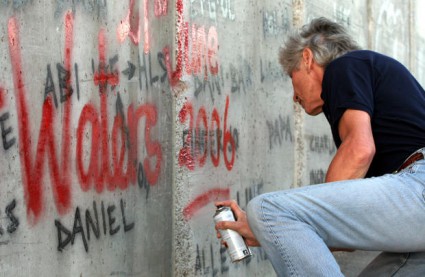
Roger Waters, British rock legend and co founder of the group Pink Floyd, visiting Israel’s separation wall surrounding the West Bank town of Bethlehem on June 21, 2006. Waters wrote slogans as “Tear down the wall” in a protest against it and the affect it has on the Palestinian population. (MaanImages / Magnus Johansson)
Legendary UK musician, Pink Floyd’s Roger Waters, has reiterated his strong support for the Palestinian campaign for self-determination in a statement announcing a forthcoming conference in Brazil to support and expand the global movement for Palestinian rights.
Waters’ is a long-standing supporter of the Palestinian campaign to boycott, divest from and sanction Israel.
The World Social Forum Free Palestine will take place in November 2012 in Porto Alegre.
“The object will be to create an international gathering there,” said Waters, “that will encourage the basic human instinct in all men and women of good faith to unite in support of the Palestinian people in their struggle for self determination.”
Waters visited Palestine in 2006 and painted graffiti on Israel’s apartheid wall in the occupied West Bank.
The visit, and Waters’ support for BDS, came after Palestinians appealed to Waters to cancel a concert in Tel Aviv, an appeal the artist heeded.
Since that time, Waters observed in his statement, “All over the world, our movement is growing.”
Full statement by Roger Waters
Rio de Janeiro Wednesday 28th March 2012
Since visiting Israel and the occupied territories in 2006, I have been part of an international movement to support the Palestinian people in their struggle for freedom, justice and equality.
I am honored to have been asked by the Palestinian BDS National Committee, to announce an initiative, to hold the World Social Forum Free Palestine in Porto Alegre, Brazil in November of this year, in cooperation with the Brazilian social movement and international civil society networks.
The object will be to create an international gathering there, that will encourage the basic human instinct in all men and women of good faith to unite in support of the Palestinian people in their struggle for self determination.
All over the world, our movement is growing.
Encouraged by events like the one coming here to Brazil, our voice will grow. …more
March 29, 2012 No Comments
Screening Žižek: Laconic Axe vs Lobottonised Thought
Screening Žižek: Laconic Axe vs Lobottonised Thought
By Paul Taylor – 28 March, 2012
In the second of his essays on “Screening Thought” Paul Taylor explores the wider constraints imposed on serious thinking by the media. Despite the problems caused by Zizek’s popularity, his celebrity-intellectual persona still retains an important aspect of “the return of the repressed” – abstract thought’s stubborn survival in a heavily mediated age.
In Part One Paul A. Taylor discussed how events like Screening Thought (May 20011 at the ICA, London) demonstrate the difficulty of refocusing the attention of Zizek audiences away from his individual qualities to the substance of his thought. In Part Two Taylor uses the specific experience of Screening Thought as a springboard for exploring the wider constraints imposed on serious thinking by the media.
The Media’s Ideological Wheelbarrow
“There is an old story about a worker suspected of stealing: every evening as he leaves the factory, the wheelbarrow he rolls in front of him is carefully inspected. The guards can find nothing. It is always empty. Finally, the penny drops: what the worker is stealing are the wheelbarrows themselves … “ (Zizek, Violence: 1)
The media screens thought both literally and figuratively – whilst lots of its lowbrow content does not bear seriously thinking about, more significantly, nominally serious programmes just don’t bear thinking. The most important aspect of the media’s conceptual screening comes, like the wheelbarrow-stealing worker, from the brazenness with which it carries its empty content past its observers.
Even in news or cultural programmes that have pretensions to promote considered analysis, readers should be familiar with these generally unquestioned features of the media grammar that openly structures “serious” coverage:
– time-scales for each item that are so tightly constrained that discussions are routinely truncated with the ubiquitous line: “I’m sorry we’ll have to stop there/that’s all we have time for”
– a disproportionate, sometimes almost exclusive, dependence upon (often crass) visual metaphors and/or verbal puns (Channel 4 News springs to mind)
– the extremely narrow range (in terms of both social and political class) of the “expert” commentators from whom opinions are sought
– the predominantly unquestioned status quo-friendly nature of news content – e.g. prime time medical updates on members of the Royal Family, high-profile obituaries for media personalities/journalists
– the requirement of a topical hook without which an otherwise important story will not register on the media’s radar
– a presenter through whose celebrity persona items are invariably mediated
Zizek’s theory of violence helps to illuminate the profound implications of these otherwise standard operating media procedures. He opens up the common-sense notion of violence to show that whilst we almost exclusively tend to understood the concept in terms of individually identifiable outbursts and destructive acts, in everyday reality, the most pervasively violent aspects of life are actually contained within the only apparently neutral selection processes that determine how that everyday reality is defined in the first place.
Zizek distinguishes between subjective and objective forms of violence and asks us to:
”… learn to step back, to disentangle ourselves from the fascinating lure of this directly visible ‘subjective’ violence, violence performed by a clearly identifiable agent. We need to perceive the contours the background which generates such outbursts. A step back enables us to identify a violence that sustains our very efforts to fight violence and to promote tolerance … there is a ‘symbolic’ violence embodied in language and its forms … this violence is not only at work in the obvious – and extensively studied – cases of incitement and of the relations of social domination reproduced in our habitual speech forms: there is a more fundamental form of violence still that pertains to language as such, to its imposition of a certain universe of meaning. Second, there is what I call ‘systemic’ violence, or the often catastrophic consequences of the smooth functioning of our economic and political systems.” (Violence: 1)
The ‘imposition of a certain universe of meaning’ succinctly describes the ease with which the contemporary media routinely excludes conceptual analysis, not through explicit prohibition, but through its implicit, “natural” functioning. …more
March 29, 2012 No Comments
King Hamad’s legacy of operating Bahrain as a “torture state”
Torture is back in the repertoire of Bahrain’s security services. The return of torture is especially distressing since Bahrain showed the political will a decade ago to end this scourge.
Bahrain: End Torture of Security Suspects
8 February, 2010 – Joe Stork – Human Rights Watch
(Manama) – Bahrain needs to take urgent steps to end torture and ill-treatment of security suspects during interrogation, Human Rights Watch said in a report released today. The government should promptly investigate all torture allegations and prosecute security officials suspected of abusing detainees.
The 89-page report, “Torture Redux: The Revival of Physical Coercion during Interrogations in Bahrain,” is based on interviews with former detainees and a review of forensic medical reports and court documents. It concludes that since the end of 2007, officials have repeatedly resorted to torture for the apparent purpose of securing confessions from security suspects.
“Torture is back in the repertoire of Bahrain’s security services,” said Joe Stork, deputy Middle East director at Human Rights Watch. “The return of torture is especially distressing since Bahrain showed the political will a decade ago to end this scourge.”
Bahrain’s reversion to these discredited practices has come with rising political tensions. Street demonstrations by young men from the country’s majority Shia Muslim population protesting alleged discrimination by the Sunni-dominated government have deteriorated with increasing regularity into violent confrontations with security forces. Arrests have often followed. Security officials appear to be using painful physical techniques to elicit confessions from many of those arrested.
These techniques include electro-shock devices, suspension in painful positions, and beatings. Some of those who were detained reported that security officials threatened to kill or rape them or members of their families. Many were subjected to more than one of these practices.
The use of these techniques, separately and in combination, violates Bahrain’s own laws as well as its obligations as a state party to the United Nations Convention against Torture and Other Cruel, Inhuman or Degrading Treatment or Punishment (Convention against Torture) and other international treaties.
“The government should promptly investigate all torture allegations and prosecute offenders according to international fair trial standards,” Stork said. “Authorities should also suspend immediately any security official if credible evidence exists that he ordered, carried out, or acquiesced in acts of torture.”
Officials with the Ministry of Interior and the Public Prosecution Office, in separate meetings with Human Rights Watch, denied that security forces employed torture. They said the consistency in the accounts of the former detainees was evidence that the allegations had been fabricated. …more
see full Report HERE
March 29, 2012 No Comments
Extrajudical killing become Standard MOI Practice following BICI Report last year
At least 31 extrajudicial killings since official commission of inquiry, says Bahrain Center for Human Rights
28 March 2012 – IFEX
Since an official commission of inquiry last November recommended reforms to address Bahrain’s human rights violations in last year’s uprisings, the Bahrain Center for Human Rights (BCHR) has documented at least 31 “extrajudicial killings” in Bahrain.
Most of the deaths were from teargas inhalation, including three in the past week alone, and three were as a result of torture in custody, says BCHR in a new report reviewing progress since the Bahrain Independent Commission of Inquiry (BICI)’s findings were presented.
Human Rights Watch also issued its own report following a national commission’s assessment that lauded the government’s progress.
BCHR’s Post-BICI Report accuses the regime of new cases of torture, kidnapping and arbitrary arrests, despite government assurances to the contrary. It calls for an immediate end to violations, as well as reparations for victims and punishment of offenders.
BCHR also points out that the government continues to deny responsibility for any of the killings – not a single police officer has been convicted of torture or murder since the uprising started last February.
Another key finding of the BCHR report, which is broken down by type of violation, is that on average, 15 villages are tear-gassed every single night. The tear gas is imported, prompting BCHR to demand that the international community end its arms deals with Bahrain.
The report is dedicated to the former BCHR president, Abdulhadi al-Khawaja, who is serving a life sentence for his involvement in last year’s protests. Now on the 49th day of a hunger strike, he says he will continue to refuse food “until freedom or death.” Earlier this month, 50 groups worldwide, including many IFEX members, called for his release. …more
March 29, 2012 No Comments
F1, Prestige and Power, fuel King Hamad’s Rhetoric of Reform
Questions Surround Bahraini Government Commitment to Reform
29 March, 2102 – POMED
Al-Jazeera reported that the government argues that it has fulfilled the obligations of the BICI report released in November, but rights groups argue the opposite: the government has largely ignored “critical recommendations” and has yet to deal with “accountability for torture and relief for those unjustly imprisoned during the uprising.”
On Wednesday, Human Rights Watch released a report documenting dozens of cases of citizens imprisoned simply for speaking out and demanding change. “No high-ranking officials have been investigated for their role in rampant torture or unlawful killings,” said Joe Stock, the deputy Middle East director at HRW.
Reports of abuse question the decision being contemplated by Formula One chief executive Bernie Ecclestone to carrying out the grand prix. AA poll taken in F1 Racing Magazine shows that nearly 60% of international fans said it was “not right” for the gran prix to proceed. About 24% said it was right. The ethical questions surrounding F1’s decision have only been made worse by recent reports that show the conditions of the country may be worsening.
Today, Human Rights First testified before congress documenting the continuing human rights abuses as the government of Bahrain unremittingly oppresses its people. This testimony questions the morality of another decision: the decision to re-consider a new arms sale to Bahrain. “The Department of defense plays an important role in demonstrating leadership abroad,” said Sadia Hameed of Human Rights First urging the committee members to protect American values. …more
March 29, 2012 No Comments
King Hamad and Eccelstone drags F1 teams into abyss of immorality
Bahrain Grand Prix organisers launch ‘PR offensive’ as poll says ‘race is not right’
By Tom Cary – 28 March 2012 – UK Telegraph
Formula One chief executive Bernie Ecclestone, McLaren team principal Martin Whitmarsh, Williams co-founder and team principal Frank Williams, Red Bull team principal Christian Horner and Mercedes GP chief executive Nick Fry were all present as Bahrain race organisers hosted a lunch for “friends and colleagues” at the Royal Automobile Club on London’s Pall Mall.
But the scale of the PR battle they face to convince the sport – let alone the political and human rights groups opposed to the race – that returning to the kingdom after last year’s bloodshed is the right thing to do, is illustrated by the results of a survey carried out by F1 Racing magazine.
About 60 per cent of nearly 10,000 international fans polled said it was “not right” for the grand prix to go ahead this year. Only 24 per cent said it was right. The full results of the survey will be published in the April issue of the magazine, which goes on sale on Thursday.
The results will come as no great surprise to organisers of the race who have been battling the negative perception of their country ever since a brutal crackdown on civil unrest last spring left at least 35 dead and many more injured.
In his welcome speech on Wednesday — which he jokingly described as a “PR offensive” — circuit chairman Zayed R Alzayani said the perception was skewed. He described the race as a “national event for all the people of Bahrain, regardless of creed or colour”, and claimed it was worth half a billion dollars to the economy. …more
March 29, 2012 No Comments
Freedom for AlMahfoodh and all Political Prisoners!
March 29, 2012 No Comments
King Hamad hires troupe of Magicians to augment Public Relations appointees from US Democratic National Committee
The Police Camera Protects the Perpetrators of Torture and Ill-treatment
29 March, 2012 – Bahrain Youth Society for Human Rights
Bahraini authorities said that they installing video cameras in police stations to prevent torture and ill-treatment of detainees, But the cameras, introduced after an inquiry by Bahrain Independent Commission of Inquiry (BICI).
BICI Report: (1722/G)- “There should be audiovisual recording of all official interviews with detained persons”
The Bahrain Youth Society for Human Rights (BYSHR) monitored in recent months, cases of allegations of torture took place in the informal centers of riot police, But the detainees said yesterday (March 28, 2012) that they had been tortured in the police station in Isa Town.
The BYSHR met with victims of torture and ill-treatment in the village of Nuwaidrat and confirmed that they were tortured in the “Isa Town Police Station”. …more
March 29, 2012 No Comments
Protecting Internet Freedom
Global Voices Advocacy – Defending Free Speech Online
by Rebecca MacKinnon – 26 March 2012 – Global Voices
Pakistan’s anti-censorship activists recently proved how coordinated, global and local action can make a real difference.
Last month, Pakistan’s government publicly solicited proposals from companies around the world to create an automatic URL filtering system to block “objectionable” content. The request triggered a wave of protests which began with the local group Bolo Bhi and spread quickly to international groups like Access Now who wrote letters to tech companies’ CEOs urging them not to bid on the project, and launched online petitions which gathered tens of thousands of signatures. The Global Network Initiative (GNI), Electronic Frontier Foundation (EFF), Bytes for All, Reporters Without Borders (RSF), Business & Human Rights Resource Centre, all issued statements urging technology companies to consider the impact of the tender on the human rights of citizens in Pakistan.
Their message was received and absorbed at least by some. Five of the eight companies petitioned, including Websense, Cisco, Verizon, Sandvine and McAfee, have declined join the Pakistan government’s censorship attempt. On the other hand, Huawei, Blue Coat, Netsweeper, and ZTE did not respond to calls from the advocacy groups before the deadline of the proposal on March 16. Now the Express Tribune has reported that as a result of the protests, the Pakistani government may step back from its censorship plans.
More broadly, the Human Rights Commission of Pakistan has voiced its concern over challenges to freedom of expression and the Pakistani government’s plans to censor the media and the Internet. It “demands the media, civil society and the people in general must be consulted before any changes are considered in the law. The media should do more to counter radicalisation and intolerance. It regrets that the misuse of blasphemy laws and the official apathy and appeasement of extremists have continued.”
More censorship news
March 12, marked the World Day Against Cyber Censorship, and the publication of the annual “Enemies of the Internet” report by Reporters Without Borders (RSF). According to the list, Bahrain, Belarus, Burma, China, Cuba, Iran, North Korea, Saudi Arabia, Syria, Turkmenistan, Uzbekistan and Vietnam were named as the worst offenders in online censorship, while other 14 countries, including Australia and France, are “countries under surveillance”, which means that the citizens of these countries are also facing increased censorship.
Although RSF does not rank the countries listed as the “Enemies of the Internet”, Matthias Spielkamp from the German branch of Reporters Without Borders pointed out in an interview by Deutsche Welle that China and Syria “would be candidates for a top 3”.
Some organizations and companies such as The Bahrain Center for Human Rights and Google also released statements against censorship in observance of the day.
The government of Iran is moving forward with plans to build a domestic Internet meant to shield the Iranian people from “harmful” content online. Amnesty International recently published a briefing paper outlining the tightened cyber control by Iranian government.
The Tajik government requested the country’s Internet Service Providers block Facebook and four news websites. According to media report, the blocking was the result of the publication of some sensitive articles which criticized the government.
Facebook and Google have begun their trial in India over the objectionable content on their websites.
According to a study conducted by Carnegie Mellon University, the Chinese censorship mechanism used on the popular microblog platform Weibo has been quite nimble and adaptive. The study outlines for the first time the ways in which the censorship system functions on this new media platform.
Sina Corp, the company which owns Weibo, estimated that 60% of its microblog users will complete the real-name registration process by the deadline of March 16.
PayPal announced a policy that it would not process transactions for ebooks which contain erotic content. However, the decision spurred a backlash from free speech advocacy groups. Facing the criticisms of conducting censorship, PayPal finally stepped back and allowed sale of legal fiction with erotic materials. …more
Most of this report was researched, written, and edited by Weiping Li, Mera Szendro Bok, James Losey, and Sarah Myers.
March 29, 2012 No Comments

